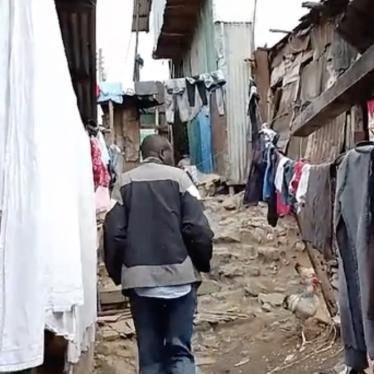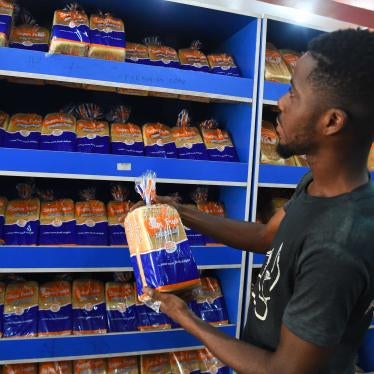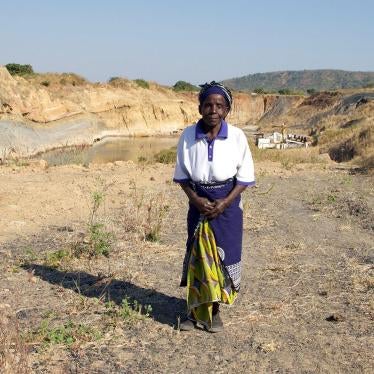Amid the tributes to Ethiopia’s recently departed prime minister was much twittering (and tweeting) about ‘stability’ and the ‘transition’, especially from Ethiopia’s foreign donors. There is considerable concern that without Meles Zenawi, the charismatic former rebel leader who ruled Ethiopia for 21 years until his death, the country may implode, infighting might engulf the ruling party or Ethiopia’s fragile economic growth might reverse. While these fears about the country’s stability are warranted, there has been little recognition of the role that human rights play in underpinning stability. Sadly that is nothing new.
On September 21, Meles’ former deputy and foreign minister, Hailemariam Desalegn, was sworn in as his successor as both prime minister and ruling party chief. In his inauguration speech, Hailemariam pledged to continue Meles’ policies. These, it should be remembered, included not only far-reaching plans for economic development, but crushing political opposition, the evisceration of independent media and civil society, and the use of arbitrary detention, torture, and other repressive measures to suppress dissent.
Three days later, the World Bank approved its biggest grant to Ethiopia, $600 million, for the third phase of its flagship Protection of Basic Services (PBS) programme, along with a new Country Partnership Strategy for Ethiopia, largely drafted before Meles died, that will underpin $1.15 billion in new loans. The new Country Partnership Strategy makes no reference to the deteriorating human rights situation over the past seven years or the complex political landscape that Ethiopia now faces with Meles’ death. The only glancing reference to the profound political and human rights problems in Ethiopia comes in the last line of the document, which reads, “In the longer term there is also a risk associated with the next elections, scheduled for 2015”. Indeed there is a risk to the country’s stability created by long-suppressed basic freedoms of speech, association, assembly and democratic choice. But it is not a risk that the World Bank and other donors have done anything to mitigate.
Ethiopia’s transition is an important opportunity for Ethiopia’s friends and foreign partners to pause and encourage the ruling Ethiopian Peoples’ Revolutionary Democratic Front to return to a democratic path, respect the constitution by lifting restrictions on civil society and the press, and release political prisoners – all steps that would go a significant way to releasing the building pressure from years of repression.
So far, the party has released two Swedish journalists jailed last year for trying to report on rights abuses in Ethiopia’s Somali Region, a positive step but one that was in the works long before Meles’ death. Meanwhile, donors have said nothing about the nine local journalists who remain jailed on trumped-up charges of terrorism, or the hundreds of other political prisoners. Business as usual with Ethiopia apparently requires donors like the US, EU and UK with human rights policies and commitments to develop a blind spot to legitimate concerns that in other countries they routinely denounce.
A Forgotten Concern?
In 2005, after 200 people protesting the elections were killed and at least 30,000 opposition supporters, journalists, civil society leaders (including the staff of Action Aid and other charities) were detained, donors were forced to act, suspending direct budget support to Ethiopia. Less than a year later, aid resumed, albeit through different channels, although a 2006 interim Country Strategy noted concerns over the overlap between the state and the ruling party and risks that aid funds could be “captured” and used to bolster the regime.
Two years later, the 2008 strategy document minimised those earlier concerns, paving the way for a massive increase in aid to Ethiopia. It turned Ethiopia’s democratic deficit into a technical issue, a problem that could be addressed by building the capacity of parliament and other key institutions: in other words, not an issue of political will, but a problem that could be solved with money.
Five years on, the new country strategy published on September 25 ignores the thorny questions of human rights, democracy and good governance completely, aside from a focus on fiscal accountability. Early on the text declares that, “Good governance and state building form the foundation of the Country Partnership Strategy” – but that’s it. The rest of the document is a thorough-going plan for increasing the capacity of a one-party state in precisely the way that the 2006 strategy feared.
At least it has the advantage of clarity: it doesn’t attempt to square uncomfortable realities like how the World Bank’s social accountability component – designed to increase civic participation and programme accountability through monitoring by NGOs - is compatible with Ethiopia’s NGO law that has closed or shackled nearly all independent organisations working on good governance, human rights, advocacy and other sensitive issues. Nor does it answer the question of how a programme founded on good governance deals with a government that won over 99% of the vote in local and general elections.
The Meles Conundrum
Working on Ethiopia over the last four years I have become familiar with the confused reactions of diplomats and aid officials as they struggle to reconcile the official narrative about Ethiopia with their experience on the ground. As Human Rights Watch has presented report after report of compelling evidence of human rights abuses, some of them connected to foreign aid programs, donors have agreed with us in private, promised to investigate, publicly dismissed our findings, reneged on their promise to investigate, and then denied the problem exists. They cannot seem to decide whether Ethiopia is a development miracle or a brutal dictatorship. As one shrewd junior official put it to me, “Meles Zenawi messes with your head”.
Ethiopia’s vision that it will join the ranks of middle income countries by 2020 is repeated throughout the World Bank’s new country strategy but there is little mention of the methods with which this growth is being achieved. I never doubted Meles’s intentions or his zeal. But the gap between his vision and the reality was startling, and brutal. He pursued an approach to development that would not fly in most of the countries that gave him money. Indeed, the development economists from Western aid agencies I spoke to were a little envious of his power to commission dams and lease thousands of hectares of indigenous land without a nod to anyone. But the approach is founded on the ruling party wielding complete and unchallenged power with no room for any dissenting voices, and it relies on fear.
Meles made this approach more palatable through a combination of shrewd arguments and by limiting the contradictory reports from the ground. From 2005 onward, the ability of foreigners to access sensitive information in Ethiopia, and the ability of Ethiopians to access independent information in their own country, has steadily shrunk. As bad news bubbled up from below, more journalists fled the country after being threatened, more independent papers closed, and an alarming number of journalists ended up in jail on vague charges.
The experience of the 2010 elections was instructive. Human Rights Watch spent over six months in the countryside documenting a subtle but systematic crackdown on opposition offices, rallies, and membership through the ruling party’s pervasive state apparatus, including withholding food aid, seeds, fertilisers and jobs. Meanwhile, in Addis Ababa, Meles invited the leadership of opposition parties to conferences and, when they pulled out complaining of the noose tightening around the neck of their membership, the government painted them as spoilers. The ruling party won 99.6% of the vote, and all but two of the 547 seats in parliament.
When Human Rights Watch presented its findings of the widespread manipulation of development aid, donors claimed they had no evidence to support our allegations, even though they hadn’t really investigated. And had they tried, officially, they would have been escorted by Ethiopian government officials who would have tracked down their sources, forcing them to recant or threatening their families.
Paid for by Donors
In the five lowland regions of Gambella, Benishangul-Gumuz, Afar, Somali and the Southern Nations Nationalities and Peoples’ Region (SNNPR), large scale “villagisation” programmes are resettling 1.5 million people, purportedly so that the government can better reach them with schools, hospitals and water pumps; services paid for by the PBS programme mentioned above, recently renewed.
Villagisation is not a new concept in Ethiopia; successive governments have tried to move rural communities for ideological and practical agricultural reasons. Under Mengistu Haile Mariam, it was known as collectivisation and it contributed to appalling abuses, including the terrible famine of the 1980s. A major difference in the contemporary version is that foreign donors are effectively paying for it. As Human Rights Watch showed in a January 2012 report, many people in the Gambella region are being forcibly displaced – away from existing services to unfertile areas without amenities, and people have suffered food shortages as a result.
Prior to the Bank’s decision to approve PBS III, Human Rights Watch called on the World Bank to delay the decision on the $600 million, to trigger the Bank’s safeguards on forced displacement and indigenous peoples, and assess the very real risks that Bank money might be contributing to rights violations. They didn’t.
Meanwhile, in South Omo, Africa’s tallest dam is being constructed in the absence of proper environmental and social impact assessments. A power line to carry electricity to Kenya is also being funded by the World Bank, although not the controversial dam itself. Downstream, hundreds of thousands of pastoralists are in the process of being ‘villagised’, their riverside gardens flooded and grazing areas turned into enormous sugar plantations upon which they are expected to work. The effect on Kenya’s Lake Turkana – which is fed by the Omo River – is uncertain and a further 300,000 people in Kenya risk impoverishment too. The Ethiopian government, keen to show off its infrastructure, takes journalists on guided tours of the dam but forbids the indigenous people of South Omo from talking to the media – threatening those who do. The absence of a free media to test and examine official claims allows donors the chance to choose whom to believe.
Business as Usual
But stability and prosperity cannot be founded on repression, forced displacement, interference in the courts and closing down the opposition, media and civil society. Donors forget that, at least according to their own policies and commitments, economic development and human rights go hand in hand.
They are about to be reminded. A case in the UK is being brought by Leigh Day and Co. on behalf of a man from Gambella. Mr O alleges that the UK Department for International Development contributed to Ethiopia’s villagisation programme (via PBS) that displaced him and destroyed his livelihood. The case aims at a judicial review of the department’s human rights policy on Ethiopia. In Washington, the day before the World Bank approved all that new money, another group of residents from Gambella filed a complaint with the World Bank’s own accountability mechanism, contending that the Bank had ignored its own policies on forced displacement and indigenous peoples in Ethiopia.
In the risks to Ethiopia’s expected economic growth that are enumerated in the Bank’s new country strategy, opposition from the people who are supposed to be beneficiaries is not mentioned at all. That may be business as usual in Ethiopia, where voicing your real opinion typically lands you in jail, but it shouldn’t be business as usual at the Bank.
Ben Rawlence is a senior researcher on Africa at Human Rights Watch.








